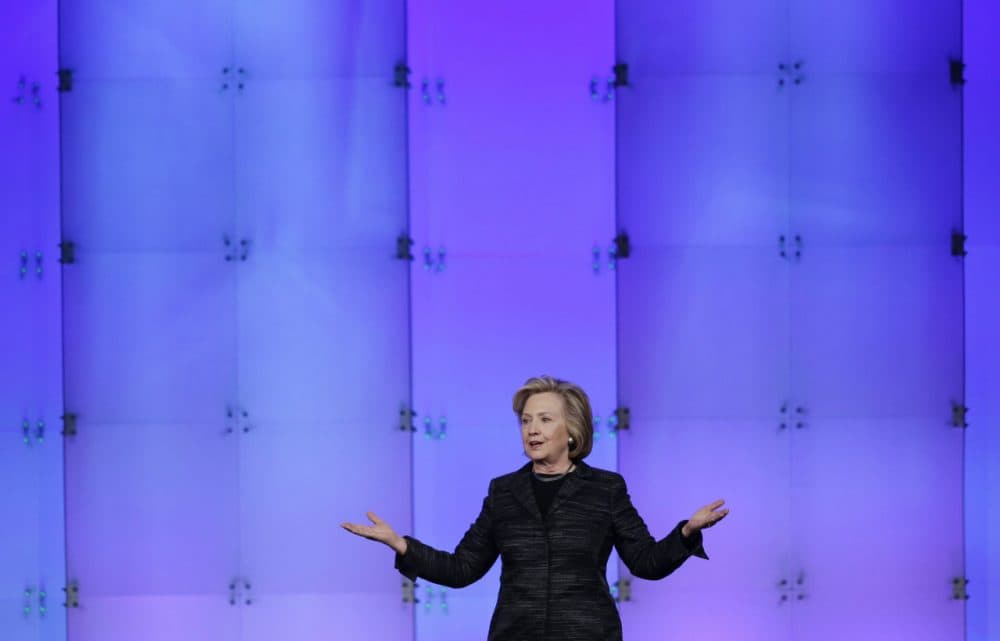Advertisement
Commentary: Massachusetts Might Be Hillary Clinton’s Least Favorite State

Hillary Clinton has done well in Massachusetts. She has raised a lot of money here, and she prevailed in the state’s 2008 Democratic primary against then-Sen. Barack Obama.
But as she worries about a possible fight for her party’s presidential nomination in 2016, Massachusetts might be her least favorite state now.
Sen. Elizabeth Warren is the main reason that our state seems less hospitable to Clinton. While Warren continues to say she has no plans to run for president, she is clearly not inclined to support Clinton any time soon. In an interview on MSNBC, Al Sharpton asked Warren if she considered Clinton a “progressive warrior” and she replied: “You know, I think that’s what we gotta see. I want to hear what she wants to run on and what she says she wants to do.”
As an economic populist, Warren could put Clinton on the defensive because of her close ties with Wall Street and the new scandal about the Clinton Foundation accepting millions from foreign governments that try to influence U.S. government officials – including during Clinton's years as secretary of state.
And if Warren was critical of Clinton’s hawkish views on military and foreign policy, she could rally progressives as antiwar candidates have in the past.
There are many reasons for Warren to change her mind and make a run, as explained last month by David Frum in The Atlantic. In a recent private meeting, Clinton apparently could not give Warren equally compelling reasons to endorse her.
Clinton knows how valuable Warren’s endorsement would be. She still probably winces when recalling Sen. Ted Kennedy’s endorsement of Obama after the South Carolina primary in 2008. That seemed pivotal, convincing many liberals to back the little-known senator from Illinois.
There’s another Massachusetts politician that has stirred speculation. Secretary of State John Kerry is not likely to enter the race but “Nobody ever says never,” he said on “Meet the Press.” While Kerry said he couldn’t envision any scenario for running and said he never thinks about it, surely he’s still haunted by his narrow loss to President George W. Bush in 2004 and wonders “What if?”
Advertisement
Yet another Massachusetts Democrat, former Gov. Deval Patrick, might have caused Clinton heartburn when he was as clear as Warren in saying there should be no coronation for Clinton. On “Meet the Press” last November Patrick said: “I think the narrative that it’s inevitable is off-putting to regular voters. I don’t think this is a criticism of her, but people read inevitability as entitlement. The American people want their candidates to sweat for the job and to make a case for why they are the right person for the job.”
Many Democrats think Clinton needs a primary contest as a warm-up for the general election, so she’s not as rusty and gaffe-prone. Many of her supporters don’t see it that way; they want to conserve resources and hope the GOP primaries are so destructive that she’ll coast to victory.
Should Clinton expect to face a real fight for the nomination? History says yes. Only incumbent presidents have won nomination without a serious challenge. In 2000, Vice President Al Gore had to face a strong contender in Sen. Bill Bradley. In 2004, Sen. John Kerry had to beat Gov. Howard Dean of Vermont.
If Clinton starts to lose support, perhaps others might run, like California Gov. Jerry Brown or New York Gov. Andrew Cuomo. So far, only three have emerged as possible challengers to Clinton: Maryland Gov. Martin O’Malley, Vermont Sen. Bernie Sanders, and former Virginia Sen. Jim Webb. None of them seem to have the charisma, cash or credibility to be a major threat early. But, as Hillary Clinton knows from her run in 2008, and as Elizabeth Warren, John Kerry and Deval Patrick can testify, the thing most predictable about politics is that unpredictable things happen.
Todd Domke is a Republican political analyst for WBUR
